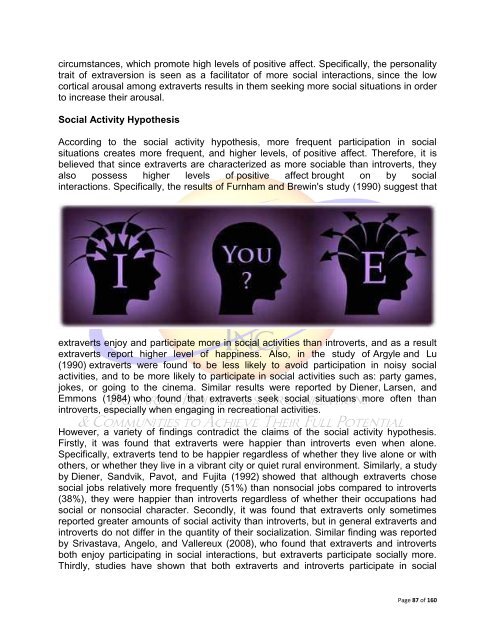The Gift of Introversion
The Gift of Introversion
The Gift of Introversion
You also want an ePaper? Increase the reach of your titles
YUMPU automatically turns print PDFs into web optimized ePapers that Google loves.
circumstances, which promote high levels <strong>of</strong> positive affect. Specifically, the personality<br />
trait <strong>of</strong> extraversion is seen as a facilitator <strong>of</strong> more social interactions, since the low<br />
cortical arousal among extraverts results in them seeking more social situations in order<br />
to increase their arousal.<br />
Social Activity Hypothesis<br />
According to the social activity hypothesis, more frequent participation in social<br />
situations creates more frequent, and higher levels, <strong>of</strong> positive affect. <strong>The</strong>refore, it is<br />
believed that since extraverts are characterized as more sociable than introverts, they<br />
also possess higher levels <strong>of</strong> positive affect brought on by social<br />
interactions. Specifically, the results <strong>of</strong> Furnham and Brewin's study (1990) suggest that<br />
extraverts enjoy and participate more in social activities than introverts, and as a result<br />
extraverts report higher level <strong>of</strong> happiness. Also, in the study <strong>of</strong> Argyle and Lu<br />
(1990) extraverts were found to be less likely to avoid participation in noisy social<br />
activities, and to be more likely to participate in social activities such as: party games,<br />
jokes, or going to the cinema. Similar results were reported by Diener, Larsen, and<br />
Emmons (1984) who found that extraverts seek social situations more <strong>of</strong>ten than<br />
introverts, especially when engaging in recreational activities.<br />
However, a variety <strong>of</strong> findings contradict the claims <strong>of</strong> the social activity hypothesis.<br />
Firstly, it was found that extraverts were happier than introverts even when alone.<br />
Specifically, extraverts tend to be happier regardless <strong>of</strong> whether they live alone or with<br />
others, or whether they live in a vibrant city or quiet rural environment. Similarly, a study<br />
by Diener, Sandvik, Pavot, and Fujita (1992) showed that although extraverts chose<br />
social jobs relatively more frequently (51%) than nonsocial jobs compared to introverts<br />
(38%), they were happier than introverts regardless <strong>of</strong> whether their occupations had<br />
social or nonsocial character. Secondly, it was found that extraverts only sometimes<br />
reported greater amounts <strong>of</strong> social activity than introverts, but in general extraverts and<br />
introverts do not differ in the quantity <strong>of</strong> their socialization. Similar finding was reported<br />
by Srivastava, Angelo, and Vallereux (2008), who found that extraverts and introverts<br />
both enjoy participating in social interactions, but extraverts participate socially more.<br />
Thirdly, studies have shown that both extraverts and introverts participate in social<br />
Page 87 <strong>of</strong> 160

















